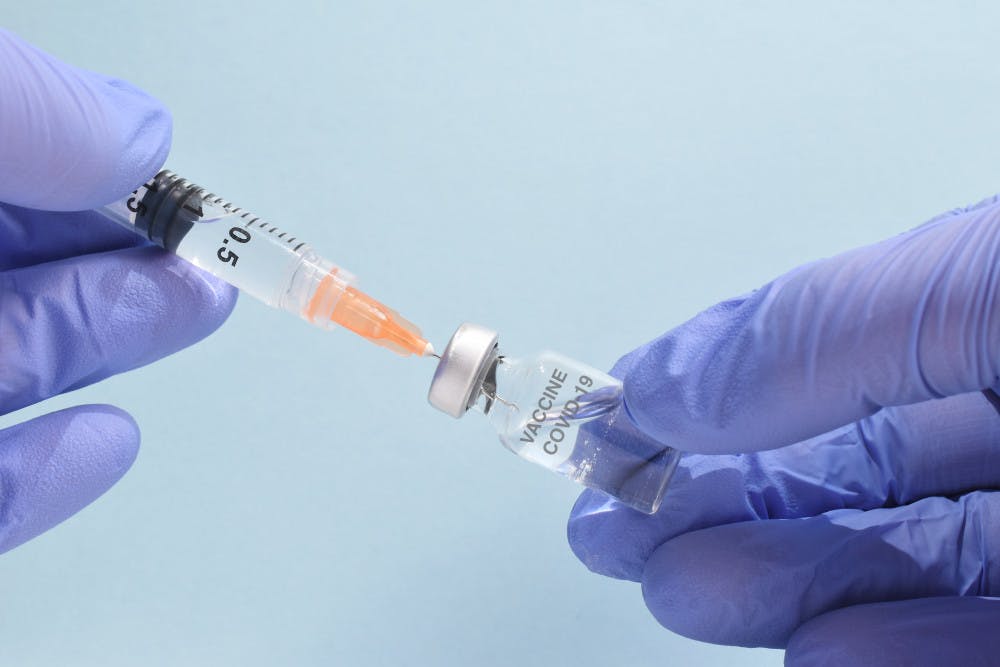By Sean Leonard
Staff Writer
Nine pharmaceutical companies pledged on Sept. 8 to ensure Covid-19 vaccine safety and efficacy before requesting approval from the Food and Drug Administration (F.D.A.).
The joint statement is intended to reassure the public that safety is the top priority in vaccine development after fears spread that the release of the vaccine is being politicized, according to The Wall Street Journal.
Pfizer, Moderna and AstraZeneca are among the nine developers that signed the pledge, and all three are currently conducting phase three clinical trials of their respective vaccine candidates, as reported by The New York Times.
The other manufacturers include Johnson & Johnson, GlaxoSmithKline, Merck, Novavax, BioNTech and Sanofi, according to The New York Times.
Because of the current pace of the trials, researchers are concerned vaccine makers will be forced to request emergency use authorizations (E.U.A.s) to get the F.D.A. green light before November, according to Vox.
Although the nine companies said they will not prematurely request approval, it is unclear when the final trials will end. According to The New York Times, Pfizer and Moderna are close to fully enrolling the 30,000 participants in their trials, but AstraZeneca is behind.
The F.D.A. has already received strong criticism for issuing EUAs for hydroxychloroquine, which was later revoked, as well as for convalescent plasma, according to Vox.
According to CNBC, the head of the F.D.A. said it would grant E.U.A.s for Covid-19 vaccines if the benefits outweigh the risks, which sparked caution from the World Health Organization.

However, the developers in the statement pledged to “only submit for approval or emergency use authorization after demonstrating safety and efficacy through a phase three clinical study that is designed and conducted to meet requirements of expert regulatory authorities such as F.D.A.”
In a news conference on Sept. 6, President Trump said a vaccine is “‘going to be done in a very short period of time. Could even have it during the month of October,’” as reported by NPR, sparking speculation that the vaccine would be rushed.
In addition, according to The New York Times, the Centers for Disease Control and Prevention (C.D.C.) sent guidance to officials in all 50 states to prepare for vaccine distribution as early as late October or early November, further raising concerns from public health experts that the Trump Administration is pushing for vaccine approval before election day on Nov. 3.
However, in an NPR interview, Moncef Slaoui, chief adviser for Operation Warp Speed, said there is a “‘very, very low chance that the trials that are running as we speak could read before the end of October.’”
Dr. Francis Collins, the director of the National Institute of Health, said to a Senate panel on Sept. 9 that predicting if a vaccine would be distributed before election day is “‘beyond anything that any scientist right now could tell you,’” The New York Times reported.
In one instance, AstraZeneca, which is partnered with researchers at the University of Oxford, paused its clinical trial because of an “‘adverse event’” in one volunteer, according to Nature.
In a private call with investors on Sept. 9, C.E.O. Pascal Soriot said one woman experienced neurological symptoms consistent with transverse myelitis, inflammation of the spinal cord, reported by STAT. The diagnosis is not confirmed yet, and Soriot said she is improving.
If the event is linked to the vaccine, it could be “‘a definitive blow to this particular vaccine candidate. If unrelated, the hold might be lifted in a matter of weeks,’” said vaccine researcher Marie-Paule Kieny to Nature.
Other experts feel that AstraZeneca’s lack of transparency is damaging public trust, and a YouGov survey estimated that only 40 percent of Americans will vaccinate themselves against the virus. Pausing clinical trials is not uncommon, as AstraZeneca briefly paused its trial for the first time in July for an “‘unrelated neurological illness,’” reported by Nature.







